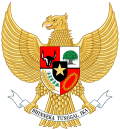Second Development Cabinet Kabinet Pembangunan II | |
|---|---|
| 29th Cabinet of Indonesia | |
| 1973–1978 | |
 | |
| Date formed | 28 March 1973 |
| Date dissolved | 29 March 1978 |
| People and organisations | |
| Head of government | Suharto |
| No. of ministers | 22 ministers |
| Member parties | |
| Status in legislature | Coalition |
| History | |
| Predecessor | Development I Cabinet |
| Successor | Development III Cabinet |
| ||
|---|---|---|
Pre-presidency Domestic policy Foreign policy Post-presidency Family
| ||
| Gallery: Picture, Sound, Video | ||
The Second Development Cabinet (Indonesian : Kabinet Pembangunan II) is the name of the cabinet of the Indonesian government led by President Suharto and Vice President Hamengkubuwono IX. The cabinet was announced on 27 March 1973 and served from 28 March 1973 until 29 March 1978.
Contents
- Cabinet leaders
- Cabinet members
- Ministers
- Officials with ministerial rank
- Notes
- References
- Book
- Newspapers and others
The Sapta Krida (tasks) of Second Development Cabinet are as follows:
- Maintaining and enhancing political stability.
- Maintaining and enhancing security and order stability.
- Maintaining and enhancing economic stability.
- Completing Repelita I and then preparing and implementing Repelita II.
- Improving people's welfare.
- Improving the order and utilization of apparatus.
- Holding general elections at the end of 1977.
During this cabinet period, The Second Pelita began (1 April 1974 – 31 March 1979). The targets to be achieved at this time are food, clothing, housing, facilities and infrastructure, welfare for the people, and expanding employment opportunities. The Second Pelita succeeded in increasing the economic growth of an average population of 7% a year. Improvements in terms of irrigation. There was also an increase in production in the industrial sector. Then many roads and bridges were rehabilitated and built.
Also during this cabinet period, the Malari incident (Fifteenth of January Catastrophe) occurred on 15–16 January 1974 which coincided with the arrival of Japanese Prime Minister Tanaka Kakuei to Indonesia.






























